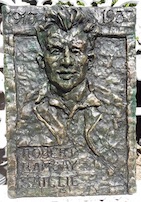The long-lost prison files of Bob Smillie, one of the ILP’s most prominent Spanish Civil War volunteers, have finally been unearthed in Valencia, casting new doubts on the official version of his mysterious death in 1937.
The dossier surfaced in September, more than 80 years after the Scot died in Modelo-Celular Prison – allegedly from peritonitis – thanks to the diligent work of researcher and writer Mariado Hinojosa.
Smillie volunteered to fight with the ILP contingent and served for a time alongside George Orwell who remembered his comrade in the lauded Civil War memoir, Homage to Catalonia.
“Here was this brave and gifted boy, who had thrown up his career at Glasgow University in order to come and fight against Fascism, and who, as I saw for myself, had done his job at the front with faultless courage and willingness…”
Hinojosa reports her discovery of the papers in The Volunteer, an online publication for veterans of the Abraham Lincoln Brigade.
She writes: “Although the documents uncovered require further analysis, they allow for some preliminary conclusions about Smillie’s fate, particularly the reasons for his arrest by the Republican authorities…
“While official sources identified the cause of Smillie’s death in prison as natural—peritonitis—some comrades and witnesses always maintained that Smillie was a victim of the Stalinist purge in Spain and the related efforts to eliminate the POUM following the internal fighting within the Republican side in Barcelona in May 1937 (the so-called May Days).”
As Hinojosa reports, the official version of Smillie’s death was communicated mainly by David Murray in 1937, a delegate appointed by the ILP to manage his detention in Spain. But the recently uncovered documents reveal a number of inconsistencies with Murray’s account.
According to Hinojosa, they suggest Smillie’s initial arrest was not random or casual, prompted by a lack of papers, but a targeted detention due to his involvement in the May Days; that his complaints of abdominal pain may have been ignored by a prison doctor; and that his medical condition could have been caused by “violent interrogations”.
“Although it is too early to draw final conclusions regarding the precise circumstances of Smillie’s death, the newly discovered prison dossier does provide new information,” she writes.
“For one, the dates in the doctors’ reports contradict the statement on the first page of the prison file that dates Smillie’s death on June 13th. It seems obvious that some kind of medical negligence took place, but it’s doubtful that it depended only on the decisions of the doctors.
“What we do know from the statements of some survivors and also witnesses, is that the interrogations carried out by the Special Services involved violent methods. Although appendicitis was often not diagnosed, leading to peritonitis and death, it is also possible the ‘generalised peritonitis’ that Smillie was diagnosed with was the result of such violent interrogations.
“In any case, while both negligence and abuse could be linked to this case, the dossier makes quite clear that the arrest of Bob Smillie was not accidental.”
She concludes: “Reconstructing Smillie’s life and death is an exercise not only in memory but also in justice; it is a tribute to a young man who left everything behind to go to an unknown country to stop fascism in its tracks.”
Smillie will be honoured in Valencia next May with a commemorative plaque designed by the Scottish sculptor, Frank Casey.
Read the full version of Hinojosa’s article here.
—-
Read more about the ILP volunteers in the Spanish Civil War here.
Land and Freedom, the ILP’s account of the Spanish Civil War, is available for £4.00 from our Publications page.




